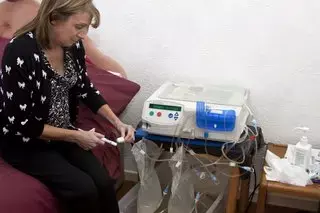- Home
- Medical news & Guidelines
- Anesthesiology
- Cardiology and CTVS
- Critical Care
- Dentistry
- Dermatology
- Diabetes and Endocrinology
- ENT
- Gastroenterology
- Medicine
- Nephrology
- Neurology
- Obstretics-Gynaecology
- Oncology
- Ophthalmology
- Orthopaedics
- Pediatrics-Neonatology
- Psychiatry
- Pulmonology
- Radiology
- Surgery
- Urology
- Laboratory Medicine
- Diet
- Nursing
- Paramedical
- Physiotherapy
- Health news
- Fact Check
- Bone Health Fact Check
- Brain Health Fact Check
- Cancer Related Fact Check
- Child Care Fact Check
- Dental and oral health fact check
- Diabetes and metabolic health fact check
- Diet and Nutrition Fact Check
- Eye and ENT Care Fact Check
- Fitness fact check
- Gut health fact check
- Heart health fact check
- Kidney health fact check
- Medical education fact check
- Men's health fact check
- Respiratory fact check
- Skin and hair care fact check
- Vaccine and Immunization fact check
- Women's health fact check
- AYUSH
- State News
- Andaman and Nicobar Islands
- Andhra Pradesh
- Arunachal Pradesh
- Assam
- Bihar
- Chandigarh
- Chattisgarh
- Dadra and Nagar Haveli
- Daman and Diu
- Delhi
- Goa
- Gujarat
- Haryana
- Himachal Pradesh
- Jammu & Kashmir
- Jharkhand
- Karnataka
- Kerala
- Ladakh
- Lakshadweep
- Madhya Pradesh
- Maharashtra
- Manipur
- Meghalaya
- Mizoram
- Nagaland
- Odisha
- Puducherry
- Punjab
- Rajasthan
- Sikkim
- Tamil Nadu
- Telangana
- Tripura
- Uttar Pradesh
- Uttrakhand
- West Bengal
- Medical Education
- Industry
Plasma vaspin levels significantly associated with survival in non-diabetic peritoneal dialysis patients

Plasma vaspin levels significantly associated with survival in non-diabetic peritoneal dialysis patients suggests a new study published in the BMC Nephrology.
Vaspin is an adipokine that regulates glucose and lipid metabolism. Plasma vaspin level is increased in chronic kidney disease but decreased in hemodialysis patients. However, plasma vaspin level in peritoneal dialysis (PD) patients, as well as its prognostic role, has not been studied.
Researchers recruited 146 incident PD patients. Their baseline plasma vaspin levels, body anthropometry, the profile of insulin resistance, bioimpedance spectroscopy parameters, dialysis adequacy, and nutritional indices were measured. They were followed for up to 5 years for survival analysis.
The average age was 58.4 ± 11.8 years; 96 patients (65.8%) were men, and 90 (61.6%) had diabetes. The median vaspin level was 0.18 ng/dL (interquartile range [IQR] 0.11 to 0.30 ng/dL). Plasma vaspin level did not have a significant correlation with adipose tissue mass or baseline insulin level. However, plasma vaspin level had a modest correlation with the change in insulin resistance, as represented by the HOMA-IR index, in non-diabetic patients (r = -0.358, p = 0.048). Although the plasma vaspin level quartile did not have a significant association with patient survival in the entire cohort, it had a significant interaction with diabetic status (p < 0.001). In nondiabetic patients, plasma vaspin level quartile was an independent predictor of patient survival after adjusting for confounding clinical factors (adjusted hazard ratio 2.038, 95% confidence interval 1.191–3.487, p = 0.009), while the result for diabetic patients was not significant.
Plasma vaspin level quartile had a significant association with patient survival in non-diabetic PD patients. Baseline plasma vaspin level also had a modest inverse correlation with the subsequent change in the severity of insulin resistance, but the exact biological role of vaspin deserves further studies.
Reference:
Than, W.H., Chan, G.CK., Kwan, B.CH. et al. Plasma vaspin levels and clinical outcome in incident peritoneal dialysis patients. BMC Nephrol 24, 206 (2023). https://doi.org/10.1186/s12882-023-03259-2
Keywords:
Plasma, vaspin, levels, significantly, associated, survival, non-diabetic, peritoneal, dialysis, patients, Than, W.H., Chan, G.CK., Kwan, B.CH, BMC Nephrology
Dr. Shravani Dali has completed her BDS from Pravara institute of medical sciences, loni. Following which she extensively worked in the healthcare sector for 2+ years. She has been actively involved in writing blogs in field of health and wellness. Currently she is pursuing her Masters of public health-health administration from Tata institute of social sciences. She can be contacted at editorial@medicaldialogues.in.
Dr Kamal Kant Kohli-MBBS, DTCD- a chest specialist with more than 30 years of practice and a flair for writing clinical articles, Dr Kamal Kant Kohli joined Medical Dialogues as a Chief Editor of Medical News. Besides writing articles, as an editor, he proofreads and verifies all the medical content published on Medical Dialogues including those coming from journals, studies,medical conferences,guidelines etc. Email: drkohli@medicaldialogues.in. Contact no. 011-43720751


